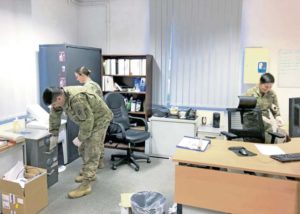For this team, success is a smell.
It’s the pinch of pungent bleach wafting into the nostrils, a crisp, waking scent many have known since childhood from watching parents scrub floors, scour sinks, and wash clothes. It’s the gleam of a freshly wiped keyboard, the feel of a high-touch surface. It’s the confidence of returning to a workspace where one sniff can tell the story of effective prevention.
Instilling that kind of confidence falls to U.S. Army Garrison Rheinland-Pfalz’s newly formed “Team Clean,” a motley group of troops pulled from units across the garrison assigned to clean workspaces of people who have tested positive for COVID-19. Team Clean deploys in three units — North, Central, and East — covering 29 sites across a 1,400-square-mile footprint. The team is one of a multitude of COVID-19 prevention measures the garrison has in place to trace, prevent and mitigate the spread of the virus.

Paper towels, spray bottles, mops, buckets and sponges are drawn as weapons against the potential lingering virus. Their armor is the personal protective equipment appropriate for their task.
Suited up like a crew rocketing into space to save Earth from a hurtling asteroid, Team Clean’s job is crucial, according to its leader.
“They not only mitigate the potential of virus spread, they also provide some level of peace of mind to the people who work in the areas where we work,” said John O’Brien, who also serves as chief of the Plans, Analysis and Integration Office for the garrison.
From idea to action, Team Clean’s formation happened in 14 days. Environmental health pros provided training in how to identify the threat — and wiping it down thoroughly. That might include cleaning mattresses and washing blankets as well as washing all walls, blinds, and windows. The work also means wiping counters, tabletops, doorknobs, bathroom fixtures, toilets, and phones.
And because this is the Army, there’s a technique to doing all this that resembles close-quarters combat tactics: “Back Wall to Door,” “First Sweep: Ceiling and Lights,” and “Second Sweep: Walls, Windows, Hard Surfaces,” are just some of the terms used during team members’ 30-minute indoctrination.
The effort didn’t get rolling without challenges, specifically finding resources to perform the work. With an already strained supply chain because of demand for cleaning products and sterilization materials, O’Brien said he eventually turned to the local economy.
“If we didn’t get creative in our approach, we would still be waiting on PPE,” O’Brien admitted, also noting that supplies are no longer an issue.
Sgt. 1st Class Kenneth Hawkins of 10th Army Air and Missile Defense Command is the lead NCO for Team Clean Central, organizing activities for the three regional groups. Team Clean draws its labor from units across the garrison. So far, teams of about a half-dozen people have deployed three times and have been eager to help.
Defense Finance and Accounting Service-Europe is one of Team Clean’s most recent clients, with Soldiers from the 10th AAMDC comprising the bulk of the cadre. DFAS-Europe’s director Tim Kuhl commended the team for its fast and meticulous work.
“The speed of the Task Force Team Clean response and quality of work performed by the Soldiers was truly phenomenal,” Kuhl said. “We cannot thank all of them enough!”
Garrison Commander Col. Jason T. Edwards said Team Clean’s role in combatting COVID-19 is vital. “Members of the team are on the front lines of prevention doing unheralded work to keep the people using garrison resources safe. I’m proud of everyone who makes up Team Clean as well as our other prevention components who have stepped up to this challenge and excelled,” Edwards said.
Performing this kind of down-in-the-weeds work is not unfamiliar to the troops helping achieve the smell of success, and Hawkins is confident they will continue to have success as the crisis continues.
“We have all had a moderate amount of experience performing the duties of a custodial engineer throughout our careers,” Hawkins said, “and remain confident we can achieve the desired effects.”


